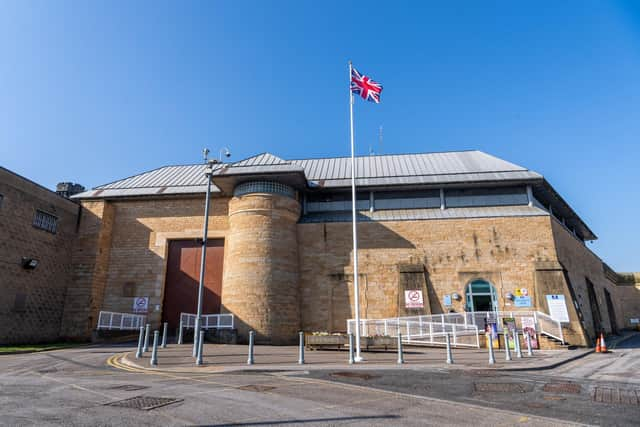Joiner found dead in Armley prison cell in Leeds ahead of upcoming trial, inquest told
and live on Freeview channel 276
Terence Papworth was found hanged in his cell at HMP Leeds on November 22 2020.
The 45-year-old was due to go on trial just over a week later for the alleged murder of Amy-Leanne Stringfellow. The 26-year-old died from multiple injuries at Mr Papworth’s home in Doncaster, South Yorkshire, on June 5 that year.


Advertisement
Hide AdAdvertisement
Hide AdAn inquest at Wakefield Coroner’s Court heard Mr Papworth was remanded to the jail, known as Armley prison, on June 8.
Jurors were told he made at least two attempts to take his own life by overdosing during his 23 weeks in prison, and was taken to hospital after an attempt in July.
Mr Papworth’s sister Jacqueline Dunn said he had also taken an overdose in May that year, saying it was “partly to do with his relationship”.
The inquest heard Mr Papworth had been on suicide watch for around 40 percent of his time in jail, but was not at the time of his death after telling a nurse he had no thoughts of self-harm or suicidal ideation.
Advertisement
Hide AdAdvertisement
Hide AdMs Dunn said the family believed her brother, who had previously been treated for depression, should have been on suicide or self-harm watch “all the way through” his period on remand.
She told the inquest: “There were lots of triggers and reasons to commit suicide.
“He’d tried to commit suicide before going there, it was his first time in prison, he was facing a lengthy sentence.
“To me these were all triggers to put him on suicide watch and an ACCT (assessment, care in custody and teamwork plan) wasn’t put in place when he got there.”
Advertisement
Hide AdAdvertisement
Hide AdMs Dunn said Papworth was “at an all-time low” and “was trying to kill himself going in there because he didn’t feel he was being (legally) represented the way he should be”.
She told the hearing that her brother did not have a “rapport” with his solicitors and was trying to get a new legal team.
“He was really anxious about the trial itself because he found it difficult to speak publicly,” Ms Dunn added.
Jurors heard that due to the Covid-19 pandemic, Mr Papworth was visited just twice by his mother and once by his sister while in prison, but spoke to them on the phone regularly.
Advertisement
Hide AdAdvertisement
Hide AdMs Dunn said he had said during these conversations that he wanted to take his own life, and “told us what he wanted at his funeral on several occasions”.
After his death, another prisoner came forward with around 15 letters that Mr Papworth had written to friends and family, saying Mr Papworth had told him to keep them in the event of his death.
The inquest heard that in the weeks before he died, Mr Papworth asked prison officers if he could be moved to a single cell so he could prepare for his trial.
Ms Dunn said he made the request because he “had lots of paperwork and the gentleman in his cell was staying up quite late”.
Advertisement
Hide AdAdvertisement
Hide AdSenior coroner Kevin McLoughlin asked Ms Dunn whether she thought Mr Papworth “was trying to engineer to get a cell on his own with a view to harming himself”.
She answered: “In hindsight probably yes, but if he would have got longer than the seven days proposed by the judge with the new solicitor then maybe not.
“The judge said ‘under no circumstances am I moving that date’.”
Ms Dunn said her brother had then had seven days to “prepare for a case that was his whole life”.
The inquest, which is due to last two days, continues.